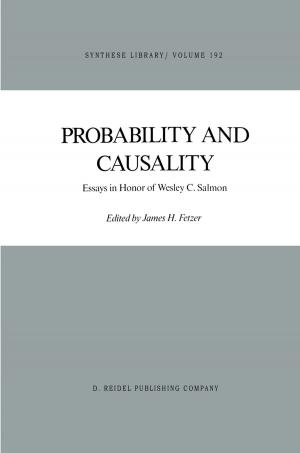Progress, Apocalypse, and Completion of History and Life after Death of the Human Person in the World Religions
Nonfiction, Religion & Spirituality, Philosophy, Religious, History| Author: | ISBN: | 9789401727914 | |
| Publisher: | Springer Netherlands | Publication: | March 9, 2013 |
| Imprint: | Springer | Language: | English |
| Author: | |
| ISBN: | 9789401727914 |
| Publisher: | Springer Netherlands |
| Publication: | March 9, 2013 |
| Imprint: | Springer |
| Language: | English |
The soul is so closely connected to life that one cannot think that it could ever be separated from life and, consequently, be mortal. Therefore, it can only be immortal. This argument from Plato's Phaedo for the immortality of the soul exhibits both a great strength and a great weakness. Its strength is that it is dif ficult for anyone to think that the soul could ever exist without life. Its weakness is, first, that not all religions accept a soul that remains the same as the center of the person - thus one speaks, for instance, in Buddhism of a "soulless theory of the human being" - and, second, that what is true does not depend on what we can think, but on what we recognize in experience and thought. The religions believe in the existence of a power that can work contrary to our experience that the soul in death is not separated from life. How the reli gions believe they can establish this continued life after death and how faith in this life is related in the religions to the interpretation of history, its progress, its apocalyptic end, and its eschatological completion and transfiguration is the theme of this book. In the culture of the West in the nineteenth and twentieth centuries, faith in the secular progress of the technological control of nature and the economic or ganization of society was the enemy of faith in the immortality of the soul.
The soul is so closely connected to life that one cannot think that it could ever be separated from life and, consequently, be mortal. Therefore, it can only be immortal. This argument from Plato's Phaedo for the immortality of the soul exhibits both a great strength and a great weakness. Its strength is that it is dif ficult for anyone to think that the soul could ever exist without life. Its weakness is, first, that not all religions accept a soul that remains the same as the center of the person - thus one speaks, for instance, in Buddhism of a "soulless theory of the human being" - and, second, that what is true does not depend on what we can think, but on what we recognize in experience and thought. The religions believe in the existence of a power that can work contrary to our experience that the soul in death is not separated from life. How the reli gions believe they can establish this continued life after death and how faith in this life is related in the religions to the interpretation of history, its progress, its apocalyptic end, and its eschatological completion and transfiguration is the theme of this book. In the culture of the West in the nineteenth and twentieth centuries, faith in the secular progress of the technological control of nature and the economic or ganization of society was the enemy of faith in the immortality of the soul.















